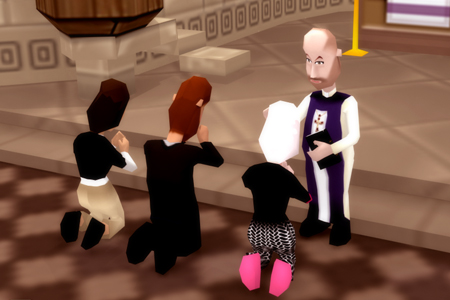| |
 |
 |
 |
| The story so far... |
 |
| You're currently on our features and projects pages, with material ranging from the satirical to the theological. For more features, click here. |
| |
|
|
 |
 |
 |
| Digital bread and wine, anyone? |
 |
Mark Howe is perplexed at how theologians and church leaders are so wary of the idea of online church. One minute they don't think it's real, but the next they're warning how dangerous it is. Mark argues that Ship of Fools should run an experiment in online communion to see what online church is really made of.
We're discussing this issue here: Online sacraments
"Online church is only the simulacrum of offline performers. It is never real." Most theological topics are hard to treat exhaustively in the micro-broadcast world of Twitter, but 140 characters turned out to be more than at least one academic needed recently to unpack his views about church on the web.
Regardless of the medium, the mention of online church – and especially online sacraments – so often brings out this kind of denial-and-emotion response. Theologians I don't know demand a justification for my desecration of ecclesiology. Pastors I know well suddenly end or divert the conversation as if I have just asked to view their personal porn collection.
Responses to the notion of online church and sacraments tend to be virulent, but in my experience they also tend to be shallow. So the response to "Why do you say online church is never real?" is often "It isn't real. It cannot be real. It is not real. You cannot make me accept it is real!"
This is curious behaviour for academics and pastors who often seem to rather enjoy being convinced by their own arguments.
Maybe those older and wiser than myself just want more time to formulate a rigorous response? In July 2010, a methodist minister called Tim Ross announced his intention to conduct a communion service via Twitter. The event was subsequently cancelled at the request of senior Methodist officials who wished to "reflect and pray deeply in order to discern what developments are appropriate". Nearly two years later, I wonder if someone could tell us what has been discerned through deep prayer, other than that this entire area is too scary by half.
Allergic to shades of grey
Opponents of online church really like their false dichotomies. "Real or not" is one favourite – we all know what is real, and the Internet definitely isn't, QED. My usual response is to ask for the password of their unreal world of online banking. Since the numbers on the screen are just a game played by offline performers, there's presumably no problem with those numbers moving from one unreal account to another, right? I have also heard that online dating can result in the authentic exchange of bodily fluids. "Virtual" is manifestly not a synonym for "not real".
"Really present" is a slightly more subtle false dichotomy. Christ promised to be present when we are gathered, you can't gather via technology, so online church isn't really church, QED. I think that argument might have related at least roughly to reality in the Stone Age, but nowadays the convenient distinction seems liable to disintegrate if anyone breathes on it.
For example, imagine a vast church building stretching to the horizon, with an act of Christian worship taking place at the front. If I continue to step backwards away from the front, at what point am I no longer present? When I can no longer see and hear what is going on? How about if – as happens routinely in many churches today – there are video repeater screens and a public address system?
If listening to a service via PA does not negate Christian gathering, does anyone really want to argue that the length of cable between microphone and speakers does negate Christian gathering? If not, does anyone really want to argue that changing the coaxial cable for an ethernet cable has theological implications?
Now it could be argued that physical presence involves more than seeing and hearing – it involves all our senses. And I might respond that offline church can at times feel like an unethical experiment in sensory deprivation. "Being there" isn't an all or nothing experience. School kids have always looked out of windows during lessons.
"People in online church have no body" is another apparently clinching argument. Where do I get one of these computers I can use without a body? Online church with Kinect-style body motion detectors and headsets might turn out to be a more intimate, participatory and embodied experience than developing bedsores in Central Hall Westminster.
A fragile consensus
If online church is disturbing, online sacraments are just plain terrifying. Pastors and theologians bluster about this horrific spectre in a "We all know what a sacrament is!!!" way. But historically and theologically, sacraments have been one of the most divisive doctrines. That's why, outside of our theological colleges and churches, the religious sense of "communicate" is much less well known than its negative, schismatic form – "excommunicate".
The Protestant reformers saw the two sacraments of baptism and communion as a sign of the authentic church, and 20th century ecumenical initiatives went to huge lengths to demonstrate that all right-thinking Christians agreed about them. Unfortunately the list of right-thinking Christians rarely includes any group willing to "rebaptise" – i.e. a large and growing proportion of all practising Christians in many countries. And then there is the Salvation Army, which doesn't offer sacraments at all.
Even among those denominations willing to pursue unity through a common commitment to despising Anabaptists, the sacraments seem like a strange place to look for common ground. Churches disagree, for example, about who can preside at communion, who can receive it, what they receive, what happens when they receive it...
And it is extremely hard to settle issues of detail because the New Testament provides astoundingly sketchy information about these rites – if indeed they are rites. The Old Testament provides pages of detail about sacrifices and rituals. By comparison, the "do this" of Jesus at the Last Supper feels a little under-specified.
Does "this" mean "whenever you celebrate the passover annually", as Jehovah's Witnesses teach? "Whenever you eat together"? "Whenever you meet"? Is "Kneel in front of an altar in a cathedral" or "Drink grape juice and scissor-cut squares of sliced bread once a month in a religious building before drinking Nescafe in the church hall" self-evidently exactly what Jesus was getting at?
In a journal of the French Reformed church, one pastor claims that we have departed from the scriptural model of communion because we use the wrong type of red wine. This may seem unlikely to British readers who had not realised there was more than one type of red wine, but it points to the unavoidable problem of boundaries. If the sacraments are a "thin place" where we experience God's presence more fully, we need to know at what point we exchange that thin place for a thicker place.
If God has promised special grace when we "do this", we need to know when, in fact, we are doing something else. The boundaries have to matter. So will any red wine do? Would white wine do, because it is still wine? Would grape juice do, because it is still a fruit of the vine? Would the tea and biscuits of the first Methodist agape meals do, because it is a shared meal? Would brake fluid do, because it is red?
A fresh opportunity
This, I suggest, is the real reason why Twitter communion is such an inflammatory notion; why theologians hesitate to take a serious look at online church in general and online sacraments in particular. Today's sacramental edifice depends on no one asking too many questions. Impending union between, say, Anglicans and Methodists and cordial relationships between, say, Lambeth Palace and the Vatican depend on sticking to the carefully honed ecumenical scripts. It isn't anger I see in the eyes of those who dismiss online church so concisely. It's fear.
Far from being a distraction, online church could act as a catalyst for a thorough re-examination of ecclesiology – something that many scholars say did not really happen during the Reformation. Maybe, for example, we could look for dynamic equivalents to 1st century table fellowship as a symbol of Christian love and transcendent presence, rather than enacting a Mediterranean meal with all the Mediterranean meal-ness taken out.
Maybe we could recognise that exclusion is still an issue in our societies – and in our churches – and that we still need symbols that challenge us prophetically. Maybe we could at least recognise that there is a large dose of polemic in the Reformers' statements about church, and that we may sometimes have mistaken 500 year-old soundbites for fundamental doctrine.
It's time for the church to get through the denial and anger phases, and to recognise that God is not a prisoner of our arbitrary boundaries – not even the ones we continue to place around virtuality. Maybe, here on this website dedicated to Christian unrest, we could aspire to more than the simulacrum of a discussion.
Maybe we could even try some experiments. How hard can it be to crack this online sacraments thing? Who's up for it?
We're discussing this issue here: Online sacraments |
|
|
|
|
|
|


